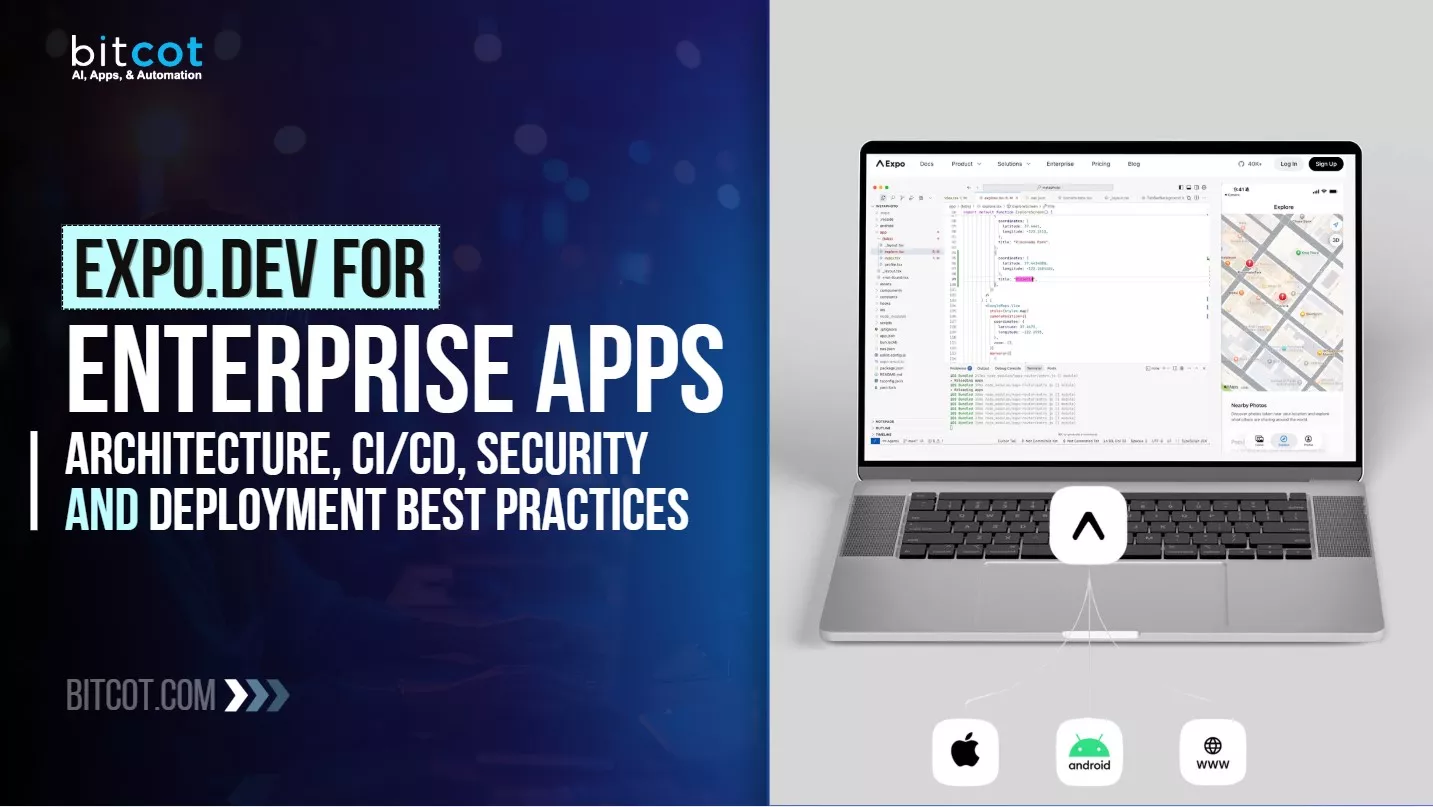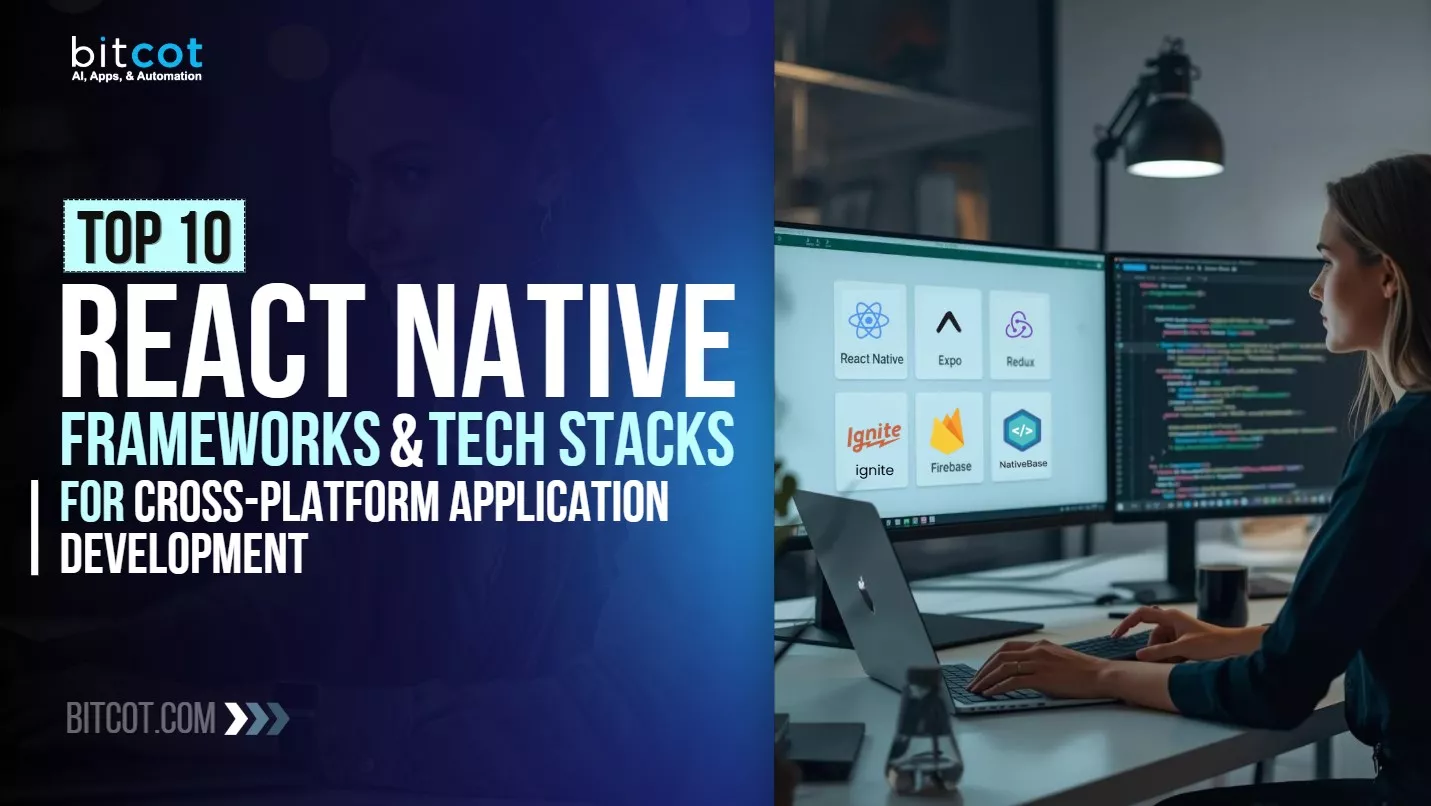
Mobile app development keeps evolving, and so do the tools behind it.
For a long time, React Native has been one of the most popular choices for building cross-platform mobile apps. Businesses and developers have relied on it because it streamlines the development process and still delivers native-like performance for both iOS and Android, all from a single codebase.
But over the last few years, something interesting has been happening.
A new player has been getting a lot of attention: Expo.dev.
Expo isn’t separate from React Native; it’s a toolset and framework built around it. What’s changing is how developers are using it. More and more React Native development teams are moving to Expo, especially for projects where speed, simplicity, and lower development overhead matter.
So why the shift?
In this blog, we’re going to look at why Expo.dev is becoming the go-to choice for many modern app projects, the benefits it brings to the table, and the situations where it may not be the best fit.
Even if you’re not a developer, understanding where Expo fits in can help you make more informed decisions about your next mobile app, whether you’re starting fresh, optimizing an existing build, or planning long-term maintenance.
We’ll also walk through the trade-offs to consider and highlight the cases where Expo may not be the right solution. That way, you’re not just following a trend; you’re choosing what actually works best for your business and your product goals.
Let’s break it down in a way that makes sense, without the tech jargon.
What is Expo.dev?

Before we dive into why Expo.dev is gaining so much popularity, it’s helpful to understand what Expo.dev actually is, and how it fits into the React Native ecosystem.
At its core, Expo.dev is an open-source framework and platform built on top of React Native, designed to make app development simpler and more productive. Expo provides a comprehensive set of tools, libraries, and services that make it easier to build, test, and deploy React Native apps without the need to deal with native code.
If React Native gives you the foundation to build cross-platform apps, Expo acts like a toolkit that smooths out many of the rough edges, so developers spend less time wrestling with setup and configuration, and more time focusing on building features that matter.
Here’s a set of powerful Expo dev tools for building mobile apps, including:
- Expo CLI: A command-line tool that makes it easy to create, run, and build React Native projects. It simplifies workflows so developers can get started quickly without worrying about complex configurations.
- Expo SDK: A collection of pre-built libraries and APIs that give easy access to device features like cameras, geolocation, push notifications, sensors, and more. These tools save time by providing ready-made solutions that work across both iOS and Android.
- Expo Go: An app that allows developers to instantly preview their work on a real device or simulator without building or compiling the code. This makes testing faster, more visual, and much more interactive.
- Expo Application Services (EAS): A set of services designed to help build, submit, and manage mobile apps at scale. Whether you’re a small startup or a growing business, EAS ensures your app can grow without adding extra complexity to your development workflow.
The primary appeal of Expo is that it abstracts away much of the complexity involved in setting up and managing a React Native project.
For businesses, this translates into faster time-to-market, lower development overhead, and a smoother path from concept to live app. Developers can focus on creating the features and experiences that matter to your users, rather than troubleshooting setup issues or dealing with platform-specific headaches.
Why React Native Developers Are Loving Expo.dev
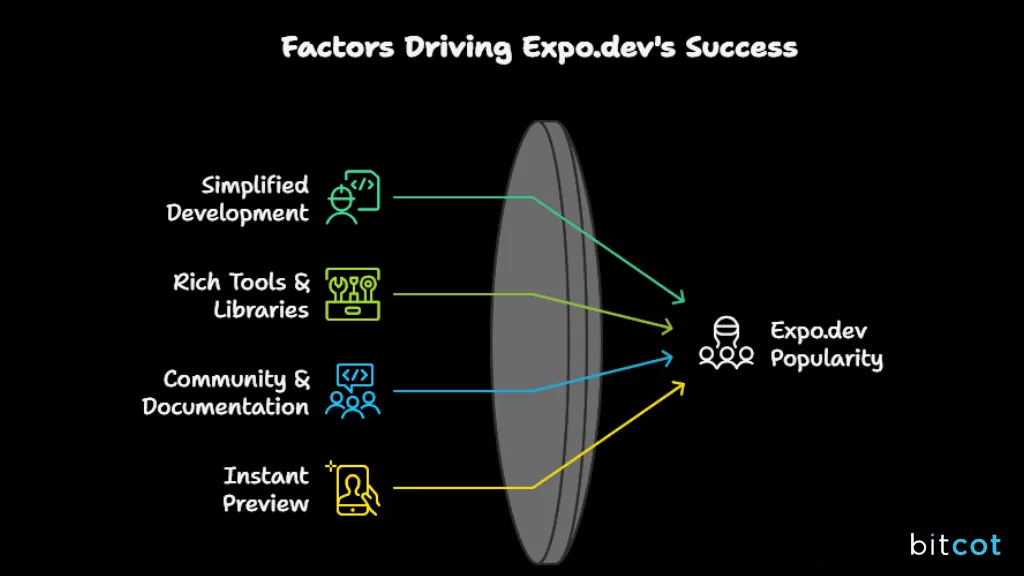
There are several reasons why Expo has been increasingly viewed as the preferred solution by React Native developers, especially for certain types of mobile app projects.
Let’s take a closer look at some of the top reasons why Expo is winning in the mobile development space.
1. Simplified Development Workflow
One of the main reasons developers love Expo is the simplified development workflow it offers. Expo reduces the complexity involved in setting up a React Native project by providing a set of pre-configured libraries and tools.
With Expo, you don’t need to worry about configuring the Android and iOS build environments, which can often be tricky and time-consuming in a traditional React Native setup. This is particularly useful for developers who don’t have a lot of experience with native code or who want to avoid spending time dealing with build and configuration issues.
The Expo CLI makes it easy to start a new project, run the app on a device or emulator, and share the app with others for testing, all without needing to configure complex native dependencies. This level of simplicity allows developers to focus on the core features of their app rather than spending time on setup and configuration.
2. Over-the-Air (OTA) Updates
Expo’s support for over-the-air (OTA) updates is another feature that has made it a game-changer for many React Native developers. Traditionally, mobile apps require an app store submission to update the app’s code, which can take a significant amount of time and requires users to download the new version.
With Expo, developers can push OTA updates directly to the app without requiring a full re-deployment to the app stores. This enables faster bug fixes, feature releases, and improvements, making the development process more agile and responsive to user needs.
For projects where rapid iteration is key, such as apps in active development or in beta testing, OTA updates can significantly reduce the time it takes to push new features or fixes to users.
3. Expo SDK and Libraries
Another reason why Expo is favored by developers is its extensive SDK and libraries that provide access to native device features without needing to write any native code.
The Expo SDK comes with pre-built components and APIs that allow developers to easily integrate features such as:
- Camera and Image Picker
- Push Notifications
- Location Services
- Contacts Access
- Sensors (accelerometer, gyroscope, etc.)
These APIs are fully supported and maintained by Expo, meaning developers don’t have to worry about managing dependencies or handling native code for common mobile features. This is particularly helpful for small teams or solo developers who may not have expertise in native iOS or Android development.
4. Expo Go App for Instant Previews
One of Expo’s most notable features is the Expo Go app, which allows developers to instantly preview their mobile apps on a physical device or simulator without the need to perform a full build process.
This feature greatly accelerates the development cycle by allowing developers to see live changes to their app without the typical delays associated with building and deploying a new version. Expo Go makes it easy to share your app with teammates or stakeholders for feedback and testing, without having to worry about setting up a complicated development environment.
5. Cross-Platform Support
Expo helps to ensure that your app works seamlessly on both iOS and Android with minimal configuration. React Native itself already provides cross-platform capabilities, but Expo goes a step further by offering additional libraries and tools designed to make cross-platform development even more efficient.
This is particularly helpful for startups and small teams who need to release their app quickly and efficiently on both major platforms, without having to spend significant time customizing for each platform. Expo’s tools and libraries abstract much of the platform-specific details, so developers can focus on building their app and user experience.
Benefits of Expo.dev for Business Leaders
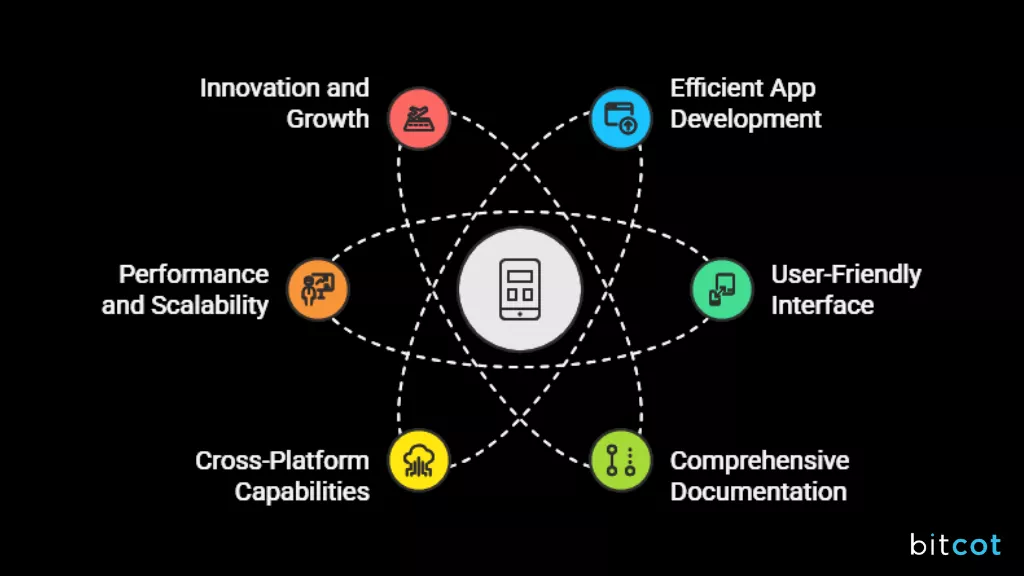
For business leaders, the value of a mobile app isn’t just in the features; it’s in how quickly it can be delivered, how efficiently it can be maintained, and how well it supports business goals.
That’s where Expo.dev really shines.
By building on top of React Native, Expo provides a streamlined workflow that balances speed, cost, and quality.
Here’s why business leaders are taking notice:
1. Faster Time-to-Market
Expo speeds up app development by providing a managed workflow and pre-built libraries, so developers can focus on building features rather than wrestling with setup. This reduces delays and allows apps to move from concept to launch much quickly. For businesses, faster delivery means earlier user feedback, quicker revenue generation, and a stronger competitive position in the market.
2. Lower Development and Maintenance Costs
By handling complex setup and platform-specific configurations automatically, Expo allows teams to spend less time troubleshooting and more time creating functionality. This efficiency reduces overall project costs and simplifies maintenance. Startups and growing businesses benefit from more predictable budgets, fewer technical headaches, and a smoother development process overall.
3. Streamlined Development for Faster Delivery
Expo.dev simplifies the app development workflow, letting teams move from idea to prototype with minimal setup.
For example, with a single yarn dev command, developers can launch the Metro Bundler, scan a QR code, and instantly test the app on real devices or simulators.

This streamlined process reduces development overhead, accelerates iteration cycles, and brings apps to market faster.
4. Unified Cross-Platform Development
With Expo, a single codebase works seamlessly for both iOS and Android, eliminating duplicate work and ensuring consistent user experiences. This approach saves resources and streamlines updates or feature additions. Teams can maintain high-quality apps across devices without extra effort, giving businesses a more efficient and scalable solution.
5. Easier Updates and Iterations
Expo makes it easy to push updates and iterate on apps quickly, without long deployment delays. Businesses can respond faster to user feedback, market changes, or new opportunities. This flexibility ensures apps stay competitive, relevant, and aligned with evolving business needs, while reducing the risk of downtime or disruptions.
6. Reduced Technical Risk
Expo manages platform-specific compatibility and common setup issues, reducing the likelihood of technical errors. This leads to smoother launches, fewer bugs, and less time spent troubleshooting. For business leaders, this reliability allows teams to focus on growth, innovation, and improving the user experience rather than solving technical problems.
Trade-Offs of Using Expo.dev for Mobile App Development
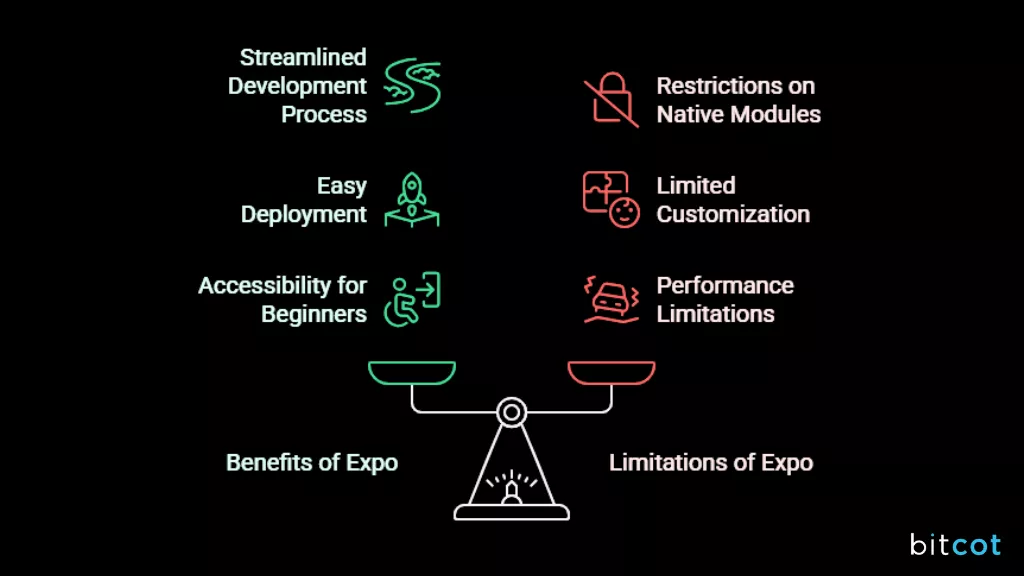
While Expo offers plenty of advantages, it’s important to remember that it’s not a one-size-fits-all solution. Like any tool, there are trade-offs and limitations to consider before deciding if it’s the right fit for your project.
Understanding these can help businesses make smarter decisions about timelines, costs, and app capabilities.
1. Limited Access to Native Modules
One of the biggest limitations of Expo is that it doesn’t automatically support every native module or third-party library. While Expo’s SDK comes with a vast collection of APIs for common features, like cameras, location tracking, and notifications, some advanced or specialized features may not be available out of the box.
If your app requires custom native code or access to highly specialized platform-specific functionality, Expo may not be the ideal choice. That said, Expo does offer the option to “eject” from the managed workflow, giving developers full access to React Native and native code when needed. So, you’re not locked in, but it does add complexity.
2. App Size
Apps built with Expo can sometimes be larger in size compared to a standard React Native app. This happens because Expo includes many libraries and tools by default, even if your app doesn’t use all of them.
For most projects, this isn’t a major issue. But if you’re targeting users with limited device storage or need to minimize download size, like lightweight utility apps, this is something to keep in mind.
3. Longer Build Times
Expo simplifies a lot of the development process, but that convenience can come at a cost: longer build times. Especially for larger apps with numerous dependencies and assets, Expo’s build system can take longer to compile and package the app compared to a fully customized React Native build.
While this may not impact early-stage MVPs or smaller apps, businesses planning frequent updates or rapid iterations should factor in potential build delays.
4. Limited Customization
Finally, Expo’s managed workflow is highly opinionated, meaning it prioritizes simplicity and productivity over complete control. For most apps, this is a huge benefit; developers can move quickly without worrying about native configurations.
However, if your project demands fine-grained control over performance or platform-specific behavior, the managed workflow may feel restrictive. Again, ejecting is an option, but it introduces additional complexity that may offset the convenience Expo provides.
When NOT to Use Expo.dev: Key Considerations for Your Mobile App
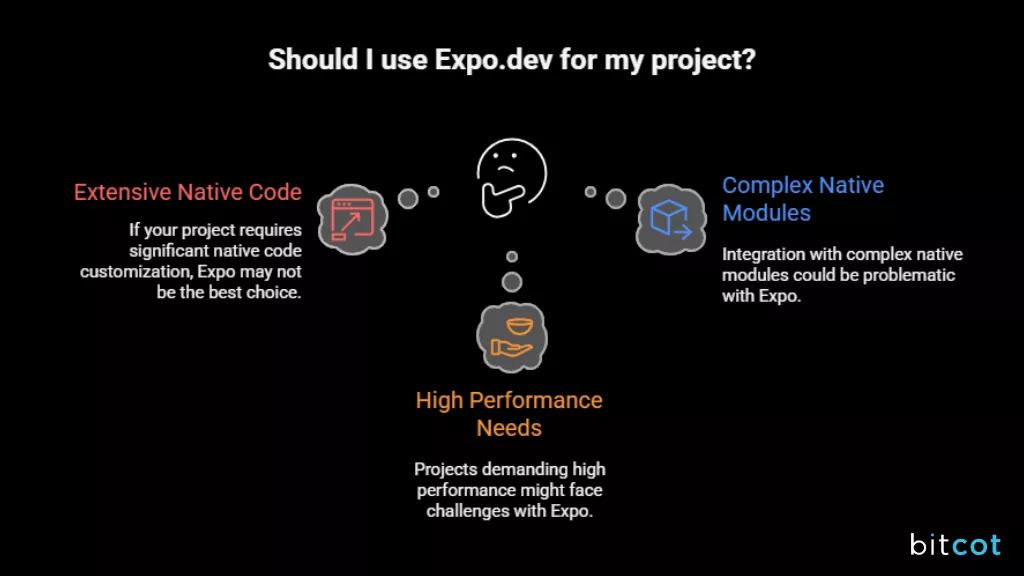
While Expo.dev offers a lot of advantages for many mobile development projects, it’s not always the perfect fit. Understanding when not to use Expo can save time, reduce frustration, and help you make a better business decision for your app development.
Here are the main scenarios to consider:
1. Apps Requiring Custom Native Code
If your app depends on custom native modules or low-level platform-specific functionality, Expo’s managed workflow may not provide the flexibility you need. While Expo allows you to “eject” to access full React Native capabilities, doing so adds complexity and reduces some of the convenience that makes Expo appealing.
2. Apps Where Size Matters
Expo includes a wide range of libraries and tools by default, even if your app doesn’t use all of them. This can result in larger app sizes for both APK (Android) and IPA (iOS) files. If minimizing storage usage is a priority, such as for utility apps or apps targeting devices with limited space, this is an important factor to weigh before choosing Expo.
3. Performance-Critical Apps
For apps that require highly optimized performance, Expo may have some limitations. While it works perfectly for most standard applications, apps with complex animations, intensive background processes, or advanced graphics might benefit from a fully customized React Native setup. Using Expo in these cases could limit fine-grained control over performance optimizations.
Partner with Bitcot to Build a Custom Mobile App Using Expo.dev
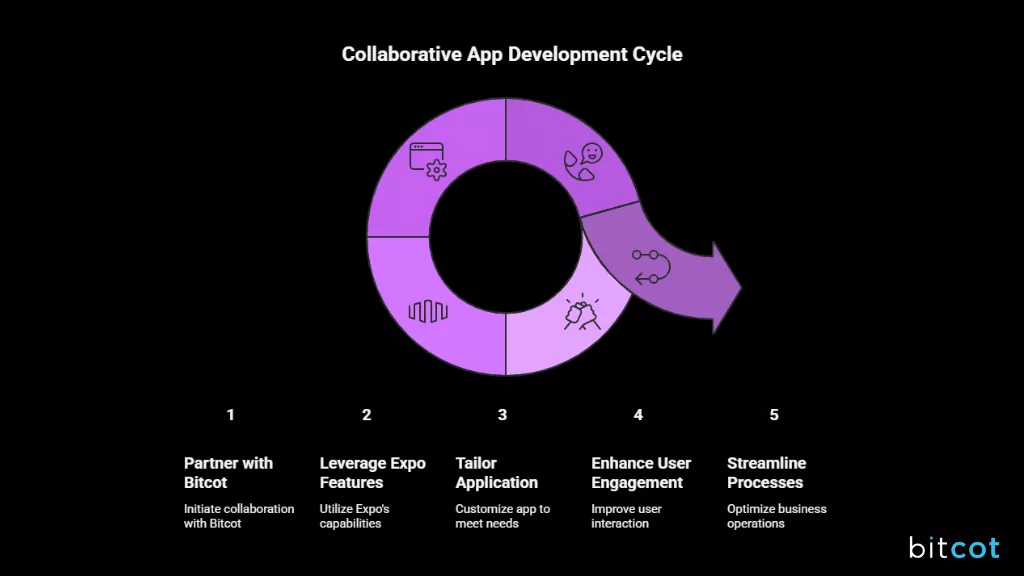
When you choose Bitcot for your Expo mobile development, you’re not just hiring developers; you’re gaining a partner who understands how to leverage Expo.dev to deliver high-quality apps quickly and efficiently.
Here’s how we help businesses succeed:
- Rapid Prototyping and MVP Development: We use Expo.dev to quickly turn your ideas into working prototypes or minimum viable products (MVPs). This allows you to validate concepts, gather user feedback, and iterate faster without committing to a lengthy development cycle.
- Cross-Platform Expertise: Our Expo dev team ensures your app works seamlessly on both iOS and Android using a single codebase. This unified approach reduces development costs, ensures consistent performance, and simplifies future updates or feature additions.
- Scalable and Maintainable Solutions: With Expo’s managed workflow and our experience, we build apps that are easy to maintain, update, and scale as your business grows. You get a solution that evolves with your needs rather than becoming outdated quickly.
- Faster Time-to-Market: Leveraging Expo.dev allows us to accelerate development timelines without sacrificing quality. This means your app can launch sooner, helping you capture market opportunities, reach customers faster, and start generating value immediately.
- Focus on User Experience: Our developers focus on building intuitive, high-performing apps that deliver a smooth user experience. By handling the technical complexities of Expo, we free your team to concentrate on what matters most: engaging your users and achieving business goals.
- Expert Guidance and Support: Bitcot doesn’t just build your app; we guide you through the process, from planning to deployment and beyond. We help you make informed decisions about architecture, features, and platform trade-offs to maximize the ROI of your app.
- Reduced Technical Risk: By combining Expo.dev with Bitcot’s expertise, we minimize compatibility issues, technical errors, and deployment challenges. This ensures a smoother launch, fewer bugs, and a reliable app that your customers can depend on.
Partnering with Bitcot means leveraging the best of Expo.dev and React Native development while keeping your business objectives front and center. We help turn your mobile app ideas into real, impactful products faster, smarter, and more efficiently.
Final Thoughts
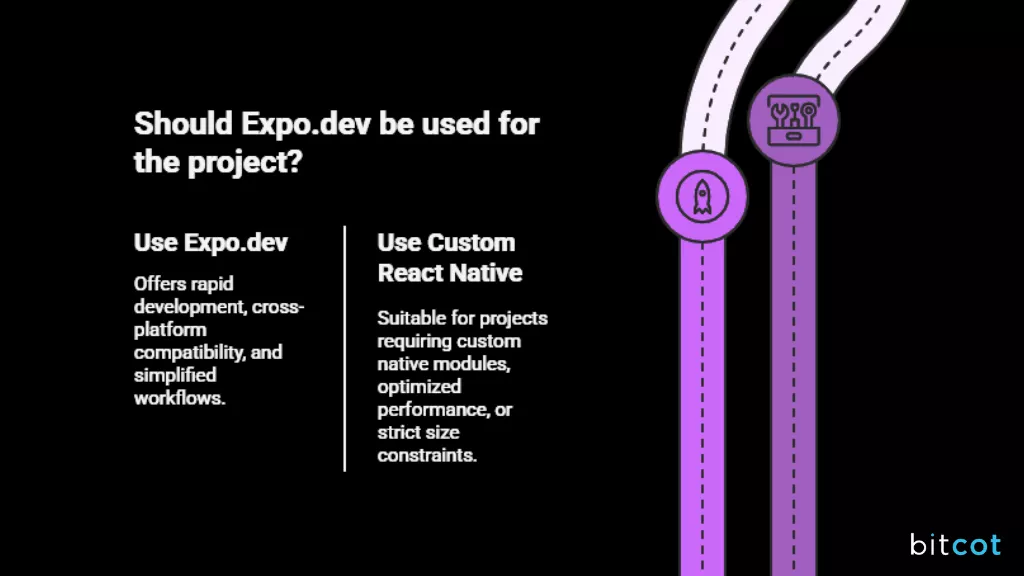
Expo.dev is quickly becoming the preferred choice for many React Native developers, especially for projects that demand rapid development, cross-platform compatibility, and simplified workflows.
By providing a rich set of tools and pre-built features, Expo allows developers to focus on what really matters: creating engaging and high-quality user experiences without getting bogged down by native code, platform-specific configurations, or lengthy setup processes.
For businesses, this means faster time-to-market, lower development overhead, and a more predictable project timeline. Startups, SMBs, and enterprises alike can benefit from the speed and efficiency that Expo brings, making it an attractive option for apps that need to reach users quickly and perform consistently across both iOS and Android.
That said, it’s important to recognize the trade-offs. Expo may not be the best solution for every project. Apps that require custom native modules, highly optimized performance, or strict size constraints might benefit more from a fully customized React Native approach.
By understanding the strengths and limitations of Expo, businesses and developers can make informed decisions, selecting the right tools for the specific needs of their app.
At Bitcot, we specialize in helping businesses leverage modern frameworks like Expo.dev to deliver exceptional mobile experiences. If you’re looking to accelerate your app strategy, consider partnering with us for custom mobile app development services that combine speed, scalability, and quality.
Get in touch with our team.



